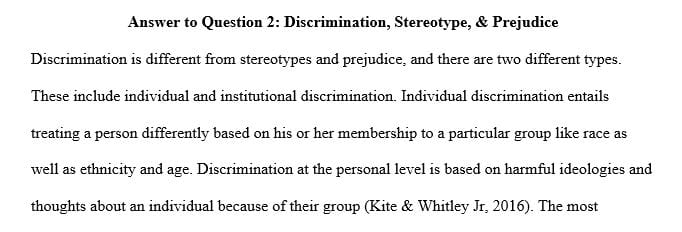Explain the difference between individual and institutional discrimination
This exam covers all readings, course activities, and lecture content assigned from Modules 01 through 06. Choose one of the five questions below. Write an essay response of 250-300 words. In your response, be sure to refer to specific concepts from the readings, lecture notes, and/or discussions, and use these concepts to support your points. Please state the question prior to your answer.
Explain what sociologist Howard S. Becker meant when he said, “it is not the act itself, but the reaction to the act, that make something deviant.”
Explain the difference between individual and institutional discrimination, giving examples of each type of discrimination. Then explain how these forms of discrimination are different from prejudice and stereotypes.
Of the three theories of global stratification (modernization theory, dependency theory, and world systems theory), which do you think is most relevant or useful for understanding global inequality? Explain why in detail, using specific examples to support your points.
Explain how functional theory would interpret the causes and consequences of technological advances in American society. Choose one particular type of technology to focus on, such as texting or social networking via Facebook or Twitter.
Compare and contrast two social movement theories, such as deprivation theory and resource mobilization theory. Use examples from a specific social movement to support your points.
Answere preview to explain the difference between individual and institutional discrimination
APA
356 words


